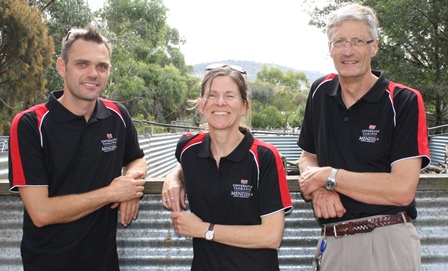Scientists induce immune response in Tasmanian devils

Scientists induce immune response in Tasmanian devils
The Save the Tasmanian devil program aim to begin field trials of a possible immunisation against the facial tumour disease has moved a step closer with the latest research published by the University of Tasmania's Menzies Institute for Medical Research.
The Save the Tasmanian devil program aim to begin field trials of a possible immunisation against the facial tumour disease has moved a step closer with the latest research published by the University of Tasmania's Menzies Institute for Medical Research.
Environment, Parks and Heritage Minister Matthew Groom said although there is still a lot of work to be done in this field, it supported the move towards a field trial to test immunisation as a tool in ensuring the devil's long term survival in the wild.
"Our priority for the Tasmanian devil is in re-establishing healthy populations in the wild," Mr Groom said.
"From all the work undertaken we know we have a sustainable and genetically diverse population within the program's insurance population – which is why the work of partners such as Menzies is so important as we move towards our focus on wild populations.
"The work has helped to lay the foundations for the Wild Devil Recovery Project, a collaboration between Menzies and the Tasmanian Government's Save the Devil Program."
The latest research has just been published in the international journal Vaccine.
Menzies' Professor Greg Woods said it provided encouraging evidence for potential development of a vaccine.
Working in the laboratory at Menzies, Professor Woods' team used dead DFTD cells to trigger an immune response.
"We were able to induce this immune response by growing a large number of cells in the laboratory. The cells were shattered into pieces and mixed with a substance to induce inflammation when injected. This activated the devil's immune system to produce antibodies against the cancer cells."
Dr Alex Kreiss, first author on the paper, acknowledged that a vaccine was still a long way off.
"Developing and testing a vaccine is a long and painstaking process. One step can take years to test so we still have a long way to go."
Vaccine is the pre-eminent journal for those interested in vaccines and vaccination. It is the official journal of The Edward Jenner Society, The International Society for Vaccines and The Japanese Society for Vaccinology and is published by Elsevier. www.elsevier.com/locate/vaccine
Copies of this paper are available to credentialed journalists upon request; please contact Elsevier's Newsroom at newsroom@elsevier.com or +31 20 4853564
Professor Woods said the support of the Save the Tasmanian Devil Appeal has been an important part of their ongoing work.
Public donations and corporate support received by the Devil Appeal reached an all-time high in 2014 with over half a million dollars raised, allowing the Appeal to fund some of the outstanding success we have witnessed in the past few years. The Save the Tassie Devil Appeal is the philanthropic arm of the Save the Tasmanian Devil Program, coordinated by the University of Tasmania Foundation.
"Evidence for induction of humoral and cytotoxicimmune responses against devil facial tumour disease cells in Tasmanian devils (Sarcophilus harrissii) immunized with kill cell preparations" by A. Kreiss, G.K. Brown, C.Tovar, B.Lyons and G.M.Woods.
DIO: http://dx.doi.org/10.1016/j.vaccine.2015.01.039. It appears in Vaccine, published by Elsevier.
Contact – Minister Groom: Jim Dunham
Phone: 0437 179 089
Contact – Menzies Institute: Miranda Harman
Phone: 0427 199 562
Contact:
Phone:
Email: